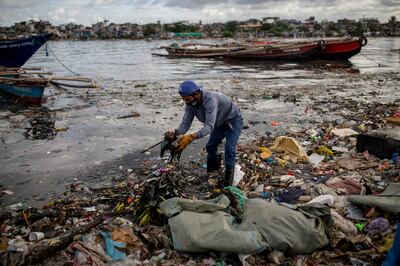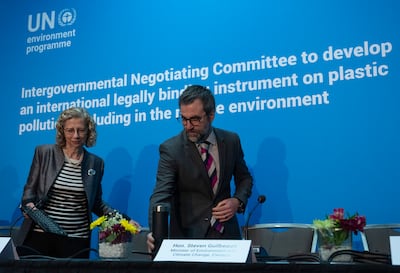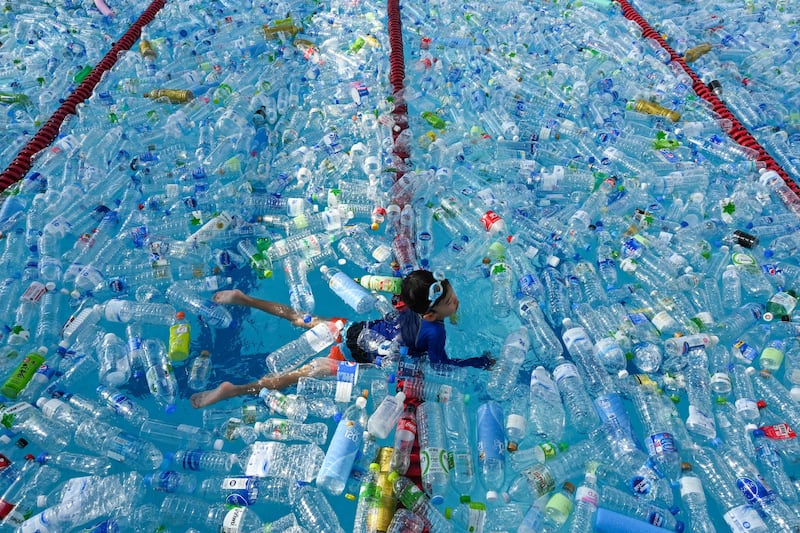This is a “pivotal” week, according to the UN, in the fight to tackle global plastic pollution – one of the most environmentally unfriendly and hard-to-degrade products humankind has ever invented. The unwieldly titled “fourth session of the Intergovernmental Negotiating Committee to develop an international legally binding instrument on plastic pollution, including in the marine environment [INC-4]” opened in Ottawa, Canada, on Tuesday.
The aim is for the 170-odd UN member states present to reach the point that a text can be confirmed at the next session in November, in order “to set the stage to finalise an instrument that will end plastic pollution, once and for all”, as Inger Andersen, Executive Director of the UN Environment Programme, put it.
Many people in South-East Asia and the wider region feel that they have a particularly personal stake in such a goal.
Last week, a letter signed by more than 100 civil society organisations, including the Global Alliance for Incinerator Alternatives, the Environmental Justice Foundation, and the International Pollutants Elimination Network, was delivered to the secretariat of the Association of South-East Asian Nations in Jakarta. It called for Asean, which represents nearly 670 million people and 10 countries – all of South-East Asia apart from Timor Leste – to take a “strong stance” in the negotiations.
The reasons for this are, alas, frequently all too obvious.
The Chao Phraya River, which flows through Bangkok, is estimated to carry about 4,000 tonnes of plastic waste into the Gulf of Thailand each year, while the Pasig River, which runs through the Philippines capital Manila, dumps 63,000 tonnes into the ocean annually. As the letter to the Asean secretariat points out, microplastics have been found in the mighty Mekong, crucial to the health and livelihoods of millions in Laos, Cambodia and Vietnam, and in the bodies of people in Thailand and Indonesia. Ecosystems and marine life in the South China Sea are increasingly compromised by plastic waste.

Some of this is down to the region’s countries not – yet – being able to cope with their own locally used plastic products. But as the letter also states: “Countries in South-East Asia bear the brunt of continuous illegal plastic waste trade from developed countries, making the region a dumping ground for wastes that are not recyclable. From single-use plastics to microplastics and toxic pollution from incineration, the unabated global plastic production will keep communities in South-East Asia at the receiving end of a disproportionate burden of toxic pollution unless Asean countries take action.”
This has become such an issue that the UN Office on Drugs and Crime recently produced a report titled Turning the Tide: A Look into the European Union-to-South-East Asia Waste Trafficking Wave. As the report notes, China’s ban on household and industrial plastic in 2018 was a “turning point”. Beijing no longer wanted to be the recipient of so much unrecyclable and heavily polluting plastic – about half the global total – and the pre-existing recycling and waste management industry in the region was not prepared for what followed.
“The ripple effect” from that, said Masood Karimipour, the report’s author, “was South-East Asia being targeted by illicit traffickers of waste. One might even say that this made South-East Asia the epicentre of waste trafficking”.
Indonesia, Malaysia, Thailand and Vietnam have been the main end points for both legal and illegal waste, and the UN report commends them for “enacting stringent requirements and regulations … in order to protect the environment and the well-being of local populations”. However, that hasn’t been enough in the face of difficulties in tracing waste (or even identifying it, as it’s often deliberately mislabelled), insufficient enforcement capacity, and laws not keeping up with the scale of the problem.
Countries in the region have attempted to fight back at illegal dumping of waste at their ports.

In 2019, Malaysia’s then-environment minister, Yeo Bee Yin, announced that 3,000 tonnes of plastic waste would be returned to the countries of origin, including Australia, saying they had been brought in under “false declaration”. Just before that, then Philippine-president Rodrigo Duterte had said he would personally ship 1,500 tonnes of rubbish back to Canada’s territorial waters if the country wouldn’t remove them (it did).
But it’s not just the EU – as the mentions of Australia and Canada above show. It’s also a much wider issue of how developed nations think about the disposal of their waste.
Last year, ABC News attached 19 trackers to plastic bags and left them at Walmart recycling bins across the US. Two of the tracking devices ended up pinging from Malaysia and one from Indonesia. “No responsible waste company in the United States, no responsible local government should be exporting plastic waste to other countries,” Judith Enck, a former Environmental Protection Agency administrator, told the TV station.
As an environment ministry spokesman said in 2019, when 83 containers of rubbish were discovered at Sihanoukville port: “Cambodia is not a dustbin.” In a similar vein, Thai cabinet minister Varawut Silpa-archa said last year: “For those who produce all this rubbish and try to dump it somewhere, I must say, please, deal with your own mess. Don’t dump it on someone else, because, eventually, it’s not just us that’s going to be affected. It’s you as well.”
The region has had enough of what many call “waste colonialism”. The current meeting in Ottawa is crucial.
If a total end to plastic pollution is not possible, future generations will not understand if today’s leaders fail to grasp that the need to drastically reduce production is urgent – and that rich countries cannot congratulate themselves on their recycling, if all they are doing is sending their rubbish thousands of kilometres away for less developed states to deal with instead.





